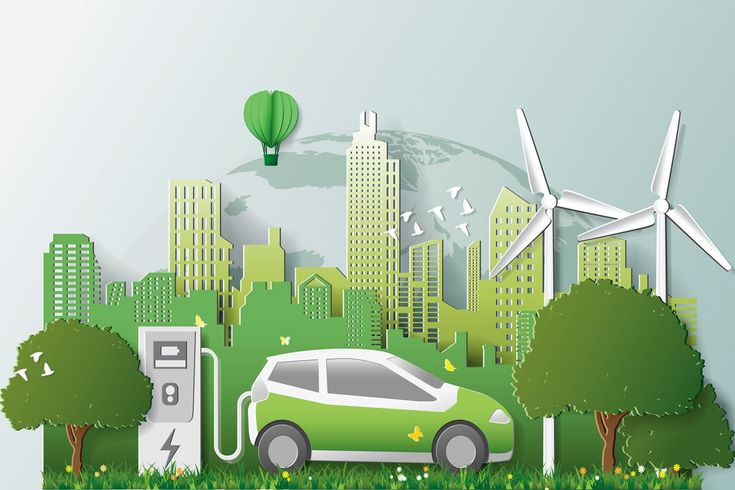The automotive industry is undergoing a significant transformation as consumers and manufacturers shift toward more sustainable transportation solutions. Electric Vehicles (EVs) and Hybrid Electric Vehicles (HEVs) are at the forefront of this change. While both options contribute to reducing environmental impact, they have distinct advantages and disadvantages. Let’s dive into a detailed comparison to help you understand which might be the better choice for your needs.
Electric Vehicles (EVs)
Electric Vehicles run solely on electricity, powered by rechargeable batteries. They produce zero emissions during operation, making them an eco-friendly choice.
Advantages of EVs
- Environmental Benefits: EVs produce no tailpipe emissions, significantly reducing greenhouse gas emissions and air pollution.
- Lower Operating Costs: Electricity is generally cheaper than gasoline, and EVs require less maintenance due to fewer moving parts.
- Smooth and Quiet Performance: EVs offer instant torque for quick acceleration and a quieter driving experience.
- Government Incentives: Many countries offer tax credits, rebates, and other incentives for EV buyers.
- Energy Efficiency: EVs convert more energy from their power source to movement compared to internal combustion engine vehicles.
Disadvantages of EVs
- Limited Driving Range: Most EVs have a shorter range compared to gasoline-powered or hybrid vehicles.
- Charging Infrastructure: The availability of charging stations can be a challenge, especially in rural or underdeveloped areas.
- Long Charging Times: Even with fast chargers, recharging an EV takes significantly longer than refueling a gasoline vehicle.
- Higher Upfront Costs: EVs tend to have a higher initial purchase price, although this is offset by lower operating costs over time.
- Battery Lifecycle and Recycling: The environmental impact of battery production and disposal remains a concern.
Hybrid Electric Vehicles (HEVs)
Hybrid Electric Vehicles combine a traditional internal combustion engine with an electric motor and battery. They offer a middle ground between conventional and fully electric vehicles.
Advantages of HEVs
- Extended Driving Range: HEVs can switch between gasoline and electric power, offering greater range and flexibility.
- Fuel Efficiency: HEVs are more fuel-efficient than traditional gasoline-powered vehicles, especially in stop-and-go traffic.
- No Charging Dependency: HEVs do not rely on external charging infrastructure since they generate electricity through regenerative braking and the gasoline engine.
- Lower Emissions: While not as eco-friendly as EVs, HEVs produce fewer emissions than traditional vehicles.
- Affordable Options: HEVs are often more affordable than EVs, making them an accessible choice for many consumers.
Disadvantages of HEVs
- Complexity: The dual powertrain increases the complexity of the vehicle, potentially leading to higher maintenance costs.
- Environmental Impact: HEVs still rely on gasoline, albeit less than traditional vehicles, which contributes to emissions.
- Less Electric Efficiency: HEVs are not as energy-efficient as EVs since they still rely on fossil fuels.
- Performance Limitations: HEVs often lack the powerful acceleration and smooth performance of EVs.
- Battery Size: HEVs have smaller batteries than EVs, limiting their ability to run solely on electric power for extended periods.
Electric Vehicles vs Hybrid Electric Vehicles: A Quick Comparison
| Feature | Electric Vehicles (EVs) | Hybrid Electric Vehicles (HEVs) |
|---|---|---|
| Emissions | Zero emissions during operation | Lower emissions than traditional cars |
| Driving Range | Limited | Extended |
| Fuel Dependency | Fully electric | Gasoline and electric |
| Charging | Requires external charging | No external charging needed |
| Cost | Higher upfront cost | More affordable |
| Maintenance | Lower due to fewer moving parts | Higher due to dual powertrain |
| Performance | Smooth, quiet, and quick acceleration | Less powerful acceleration |
Which Should You Choose?
The decision between an EV and an HEV depends on your priorities and driving habits:
- Choose an EV if:
- You prioritize environmental impact and want zero-emission driving.
- You have access to reliable charging infrastructure.
- You’re looking for lower long-term operating costs.
- Choose an HEV if:
- You need a longer driving range and flexibility.
- Charging infrastructure is limited in your area.
- You want a more affordable alternative to EVs with better fuel efficiency than traditional cars.

